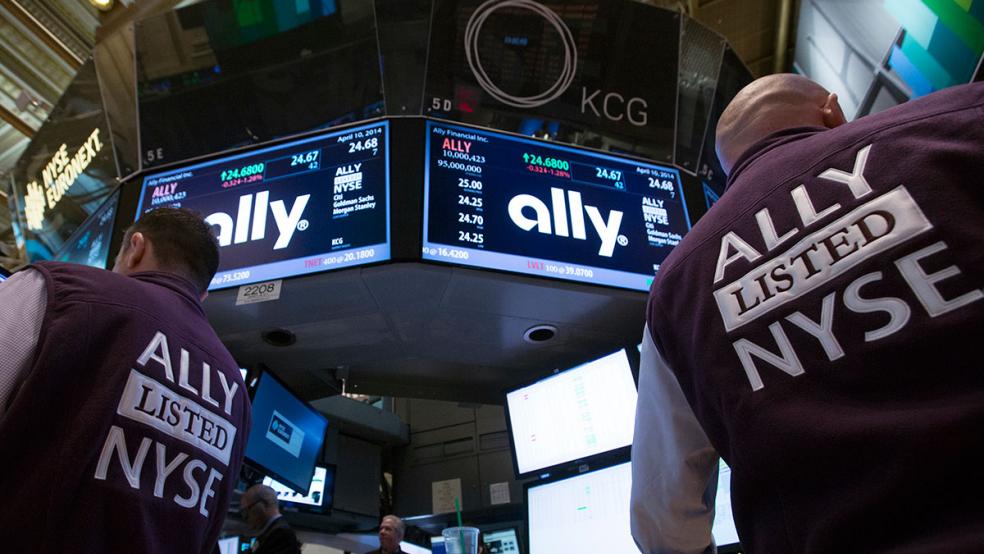Froth alert!
The IPO market has been churning ahead full speed, running at double last year’s rate and at the hottest pace since 2000. But the IPOs in the pipeline represent a mixed bag, and the renewed volatility in the stock market means investors can no longer count on broader momentum to provide a lift to any new offering.
Ally Financial (NYSE:ALLY), which fell 4 percent in its debut Thursday, sounded the loudest warning bell for the IPO market. Ally is the former GMAC, the auto loan giant. Of all the financial institutions that the government had to dash to rescue at the height of the crisis in 2008, Ally has been the slowest to emerge from the shelter of TARP, or the Treasury Department’s Troubled Asset Relief Program. Its initial public offering is – to be blunt – the height of opportunism on the part of the government, rather than a great opportunity for investors.
That’s fine: buyer beware. It has been fully disclosed that the seller of the shares is the U.S. government; that the purpose of the sale is to repay the taxpayer rather than to fuel the company’s growth. It’s hardly surprising that the government would want to sell those shares at a premium, despite the fact that the financial institution’s return on equity was a deeply unimpressive 1.92 in 2013.
Slightly more surprising is that anyone at all could be found who would want to buy them at that level, given all the issues that still hang over Ally’s head. Not in the least surprising is the fact that underwriters priced the IPO at the bottom end of the range (at $25 a share) and that they promptly dropped in trading, falling nearly 4 percent by the end of the day, more than the S&P 500’s 2 percent drop and the Nasdaq’s dramatic 3 percent plunge.
That inauspicious debut may demonstrate why a number of planned IPOs have been delayed or postponed. Still, bankers have plenty of reasons to try to keep feeding the IPO machine with deal after deal if the market settles down. Investors, on the whole, should remain eager to own stocks. (The alternative is hanging on to bonds at a time when the Federal Reserve has signaled so clearly its intention of allowing longer-term interest rates to drift higher.) And yes, all things being equal, they’d prefer to own U.S. stocks, thanks very much, in spite of yesterday’s stock market selloff and the relatively lofty valuations.
Some attractive offerings remain, of course. There are names that will draw global interest, like China’s Alibaba Group, whose business reach and ambition rivals that of Amazon and whose pending IPO may set new records. It’s also hard to sneer at the opportunity to invest in boutique investment banks like Moelis & Co., especially if it ends up being priced at a discount to peers like Evercore Partners and Greenhill & Co. As it stands today, with the Los Angeles investment bank seeking a valuation of $1.58 billion, that would appear to be the case.
Related: A Wall Street Superstar Is Ready for His IPO Close-up
Then there are the “concept” IPOs, like GrubHub (NYSE:GRUB), the online food-ordering company formed through the merger of GrubHub and Seamless, that delivered a 31 percent first-day “pop” when it went public a week ago.
So far, investors have proved fairly adept at winnowing out the wheat from growing amount of IPO chaff. They declined to view the world through the distorted lens of the underwriters of King Digital’s IPO (NYSE:KING), which crashed and burned on arrival in the market late last month. Priced at $22.50 a share, the developer of the addictive online game Candy Crush Saga now trades at about $18, with investors unwilling to pay a premium for a company that hasn’t proved its ability to follow its blockbuster success with the development of additional games.
Shares of Lands’ End, the former Sears Holdings division that made its public debut an independent business on Monday, promptly plunged 6.7 percent. Sure, the business had been profitable for Sears, but like the rest of its former parent, it had suffered from declining sales and investors clearly want to see some evidence that newly independent management are able to lure shoppers back.
Even if the broader stock market bounces back from the current selloff and the IPO machine creaks back into gear, investors need to remain alert. With each week that passes, the proportion of quality deals like Moelis and Alibaba are likely to diminish. In their place, we may see more deals with a high buzz factor or deals that can simply be pushed by bankers as the “new new thing” into the hands of investors eager to grab anything they believe might offer an above-average growth rate.
Beware of what you wish for…
Top Reads from The Fiscal Times:
- $6 Billion Goes Missing at State Department
- This Little Piggy Got Sick and Drove Up Pork Prices
- Living to 100: America's Centenarians By the Numbers






